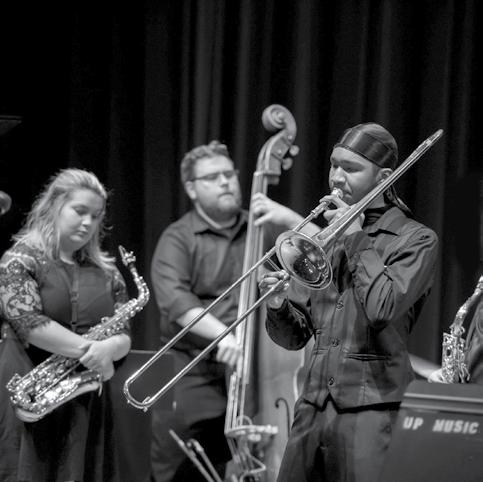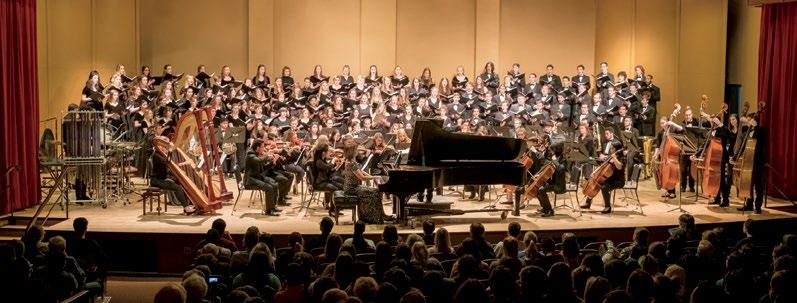
5 minute read
Teaching Tips from a Mediocre Educator: STUDENT OFFICERS
Branden Hansen OMEA All State Co-Chair
Like so many of us, I have tried increasingly over the years to judiciously delegate tasks to others (parents, students, my dog, etc.) in an effort to not go absolutely insane during the school year. We all know that “burnout” is a very real danger in our profession and also know that proper delegation is a hugely important step in maintaining some sense of personal sanity. More importantly, delegation of responsibilities to students can empower them to take ownership of their music program.
Advertisement
I have several student officer positions I fill in each of my ensembles that have proved to be an invaluable help in my daily classroom operations. These are separate from music leadership positions (section leaders, drum majors, etc.) and are, in fact, completely removed from musical ability and instead focus on the logistical, nuts-and-bolts running of our band room. Here some thoughts on student leadership that might help any systems you already have in place. It is worth noting that although I refer to these students as “band” officers, there is no reason these positions could not be easily adapted for a choir or orchestra setting.
All Positions
The goal of all these positions is to delegate the simple and mundane tasks that always seem to assault band directors at the start of rehearsals. We’ve all had those days when we’re about to step on the podium to begin rehearsal and suddenly Susan needs some trumpet parts because she forgot her music, Roger just chipped his last reed and is asking if you have one, some kid you don’t even recognize walks in with a hall pass because they are late… to the wrong class, and the percussionists just lit something on fire in the back of the room. Well, band officers can help with (almost) all of that!
All band officers are expected to attend band council meetings. We hold band council meetings once every other week during lunch and discuss the direction of the band, upcoming fundraisers, recap past events, etc.
Band officers earn credit towards their varsity letter and their grades (more on grading in a future article).
Every class (concert ensembles, percussion groups, jazz bands, etc.) has a full set of the officer positions listed below. Each position is described in detail later in the article.
• Band Custodian
• Class President
• Class Librarian
• Class Treasurer
• Class Stage Manager
Following nominations, all positions are voted on by each class via paper ballot.
Band Custodian
This position has been huge in my program. I am a neat freak and want things in their place. I have tape on my floor showing where everything goes and dang it, it better be there! These officers help make sure that happens.
It is important to note that the band custodian position is the only one that I appoint and is not voted on by students. In fact, most of my students don’t know this position exists. I expect the whole band to be responsible for cleaning up after themselves and I don’t want them thinking someone else will do it for them. Everyone cleans up their crap, but the band custodians are a secret failsafe to make sure this happens even when something slips through the cracks. (Note: I just used crap and cracks in the same sentence without trying. This is going great!)
I take all band custodians and assign them different weekly tasks that should happen in order to ensure the classroom is neat and organized and stays that way. These tasks are consistent the whole year.
Weekly jobs I assign to my band custodians include the following:
• Re-organize the lost and found
• Check band lockers for general cleanliness (we’ve all had that kid that leaves their lunch in their band locker… for 2 MONTHS!... no more!)
• Clean and organize all practice rooms
• Clean the counter and sink area (why are band sinks always disgusting?)
• Organize the drum room and percussion areas. I make sure to assign this to a percussionist.
• Search the band room in general for any loose papers or abandoned items and put them in the appropriate lost and found container
• Make sure there are adequate copies of student resources (fingering charts, band calendars, etc.)
The Band Custodians admittedly do more than most officers. With that in mind I actually waive most of their Band Fees as “payment” for their hours. I can use this to help out students who I know are struggling financially, while giving them a job along the way.
These students have a time sheet they have me sign weekly to make sure they are staying on top of their tasks.
Class President
The Class President takes attendance at the start of each class period. They record attendance in a notebook which I take and enter online during my prep or after school.
This person leads rehearsals if I am gone and is the main point of contact for any substitutes.
Class Librarian
The Class Librarian is the main point of contact for any music needs. Students DO NOT come to me asking for copies or extra parts because they left their music at home. They are trained to go to their Librarian.
The Librarian makes copies of parts as needed or hands out extra parts. They know where all the originals are and how to make copies if needed.
They also help with passing out and collecting music, ensuring parts are in score order, etc.
Class Treasurer
The ensemble’s Treasurer helps record fundraising supplies or materials that are passed out or issued. For example: They record every time a student checks out a box of chocolates to sell in a spreadsheet I provide them and train them to use.
Obviously, great caution has to be demonstrated here when deciding how to employ student help when dealing with fundraisers and money. Even if they don’t actually touch the cash, there are still things they can help with.
Class Stage Manager
Each stage manager of an ensemble is given a copy of the stage set up for their group.
On concert days, they are required to make arrangements to stay after school and help set up the theater for that evening’s performance. They set the stage for the first ensemble, help set up any microphones, assist with moving percussion out, etc.
During concerts, they (and some volunteers) are responsible for rapidly resetting the stage between groups, allowing for smooth transitions. When one group finishes, the stage managers go to work, and then I quickly bring up the next group to a stage that is already prepared for that ensemble’s specific set up. We’ve all tried to have a band of 40 exit the stage while another band of 40 is simultaneously taking the stage. Bad move.
Those are just some thoughts of how to “off-load” some simple tasks to student officers. Giving students ownership of attendance, room cleanliness, concert transitions, music distribution, etc., has been a huge help in reducing prerehearsal chaos. I step on the podium at exactly the same time every rehearsal and there’s no way I could hold that consistency without the help of our student officers who ward off a sea of small fires (can you really have a sea of fires?). I know many of you already have systems such as this in place, but hopefully there are some different student positions or twists in here that you can utilize. If not, remember I only claimed to be a “mediocre educator” at the very top anyway, so you were warned.
Please feel free to email me at bhansen@roseburg.k12.or.us if you have any questions or want copies of files I use relating to Band Officers.








